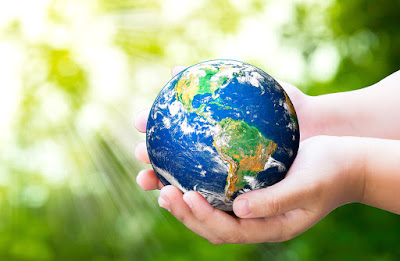How Can We be More Friendly to the Environment?
The post, from a few weeks ago, Being a Penny Pincher Even if You Don't Have To, had some excellent thoughts on being frugal without being cheap. Saving money is all about balance: cutting back where you can to be able to afford things you want. Retirement brings financial caution into focus, but it is also a time of life when we appreciate the difference between needs and wants, instant gratification and wise delays.
Several of the comments talked about being aware of our "footprint," those things we do that can have a negative impact on the earth's soil, water, and air. Being diligent about recycling, a focus on how much food is thrown away, composting, using rainwater for gardens, cutting back to one car - all are good for our budgets and our earthly home.
That raised some questions for me about what small steps we can take to help be more friendly to the environment: the air we breathe and the water we drink, the landfills that we fill with our trash, and the chemicals we use that fill the space under the kitchen sink.
One of my pet peeves is excessive packaging. One of the worst examples is pretty much gone from our lives: CD cases. Designed to stand up in the racks originally used for vinyl albums, these things were maddening, not only to get open but with the incredible waste of plastic and energy to create each one.
A new contender for wasteful king is the allergy nasal spray that will go unnamed. A two slot container contains one spray bottle. Like the compact discs, the overkill of plastic and energy needed to manufacture each one is mind numbing. No wonder each spray container is close to $20.
What I'd like to ask you to do is to share anything you do to cut waste, help protect the environment, and probably save some money in the process. What steps have you taken to cut back on the trash and garbage your household produces? Harvesting rainwater isn't practical in Phoenix, but maybe is where you live. Have you tried to catch this free water for gardens or other uses?
Do you try to avoid certain types of packaging or products that seem insensitive to this problem? Do you make your own environmentally friendly cleaning products, and do they work? What about composting? That seems like a lot of work to me, but maybe my garden would appreciate the nutrient boost.
Some of the basics like reducing electrical use by turning off TVs, computers, and stereos when not being used, washing only in cold water, running the dishwasher with only a full load are things most of us can do with little effort, but they do make a difference.
The average American creates 18 tons of CO2 every year while the average person on the plant contributes less than 4 tons. Whatever your feeling about climate change and global warming and all the factors that might affect those numbers, it is obvious we are creating that gas at a tremendous rate.
What small, or larger steps can you suggest each of us consider to reduce our addition to these numbers, create less waste, pollute the groundwater a bit less, and save money in the process?

Comments
Post a Comment